This episode’s guest is John Lee Dumas. This is a special episode because we are both recording and publishing the interview on our own channels.
John Lee Dumas is an evangelist for Puerto Rico and the host of Entrepreneurs on Fire, an award-winning podcast that has over 2000 episodes, over 1 million listens a month and reigns in seven figures of annual revenue.
John has interviewed over 3,000 incredible entrepreneurs, including Seth Godin, Gary Vaynerchuk, Barbara Corcoran, and Tim Ferriss. I am proud to say I have had some of these remarkable people on my podcast as well. John and I are both part of the Hubspot Podcast Network.
John received his bachelor’s degree in American Studies from Providence College. He is the author of The Common Path to Uncommon Success, as well as the Freedom, Mastery, and Podcast journals.
His explanation of what it takes to succeed as an entrepreneur, the power of niche marketing, and what kind of mentor is optimal are not to be missed.
Enjoy this interview with John Lee Dumas!
If you enjoyed this episode of the Remarkable People podcast, please leave a rating, write a review, and subscribe. Thank you!
Transcript of Guy Kawasaki’s Remarkable People podcast with JLD:
Guy Kawasaki:
Enter your name and email address below and I'll send you periodic updates about the podcast.
I'm Guy Kawasaki, and this is Remarkable People. I'm on a mission to make you remarkable.
This is a special episode because John Lee Dumas and I are both recording and both publishing the interview on our own channels.
John Lee Dumas is an evangelist from Puerto Rico, and the host of Entrepreneurs on Fire. This is an award-winning podcast that has over 2,000 episodes, and over one million listens a month. It brings in seven figures of annual revenue.
This podcast, where he interviews entrepreneurs, happens every day. I'm still trying to wrap my mind around that.
John has interviewed over 3,000 entrepreneurs, including Seth Godin, Gary Vaynerchuk, Barbara Corcoran, and Tim Ferriss.
I am proud to say that I've had many of the same remarkable people on my podcast.
John and I are both part of the HubSpot Podcast Network.
John received his bachelor's degree in American studies from Providence College.
He's the author of The Common Path to Uncommon Success as well as The Freedom, Mastery, and Podcast Journals.
His explanation of what it takes to succeed as an entrepreneur, the power of niche marketing, and this is something I really loved learning…what kind of person is the optimal mentor are not to be missed.
I'm Guy Kawasaki. This is Remarkable People, and now John Lee Dumas and I are going to make you more remarkable.
So, life is good?
John Lee Dumas:
Life is good, brother. I've been in Puerto Rico for six years now. I'm never leaving.
Guy Kawasaki:
Why Puerto Rico of all places in the world?
John Lee Dumas:
So, listen. I spent five glorious years building this business in San Diego, California, which I love San Diego, and my fiancé is from San Diego. I met her there. She loves it more than life itself too.
But I turned this puppy into a multi-seven-figure a year business, which means I was paying seven figures a year in taxes, and I said, "There's got to be a better way."
My accountant said, "Hey, Puerto Rico is an American territory. You don't lose your citizenship. You pay no federal tax, no state tax, just a flat 4 percent corporate tax. That's it."
Guy, this is the cherry on top. No capital gains, zero percent. So real estate stocks, cryptocurrency, I'm paying zero percent capital gains right now.
Guy Kawasaki:
Sounds like something is too good to be true. How is it?
John Lee Dumas:
I've been saying that for six years. Six years, I've been here. Thousands of people are moving here every year from the states for the exact same reason.
You're only going to be here six months of the year, then you can be wherever else you want the other six months of the year. Man, people are coming in droves, and they're never leaving.
We like to say, "Come to Puerto Rico when you're ready to keep the money you make." Hey, just six months a year. Either way, just come here.
Where you live right now?
Guy Kawasaki:
California.
John Lee Dumas:
Yeah. I love California. It's the best, but I spend a few months a year there still because I can, but I spend six months plus a year in Puerto Rico.
Guy Kawasaki:
Geez, Puerto Rico is on fire.
John Lee Dumas:
I like it.
Guy Kawasaki:
So I have to tell you a funny story. Coincidence. Great minds think alike. I dropped out of law school after a few weeks, too.
John Lee Dumas:
No kidding. Dude, that was the most courageous thing I'd ever done in my life up to that point was dropping out of law school.
Guy Kawasaki:
Are you Asian-American? So I come from a lower middle-class family in Hawaii.
By the way, people who are listening, this is supposed to be first for me, which is we're both recording, and we're both going to use it on our separate podcast. So this is a pfeifer.
John Lee Dumas:
Yeah. It's going to be a blast.
Guy Kawasaki:
Yeah, yeah. So anyway, lower class family from Hawaii, obviously, Japanese American, and the whole thing is about education and filial piety of the shtick.
So I go to Stanford, I graduate, I get into law school, I go to law school, I quit after two weeks, and I thought, "Holy shit, this is a key time, hara kiri seppuku time.
So 2,000 years of my ancestors have worked in sugar cane fields, et cetera, et cetera to get me to law school, and you little shit, you quit after two weeks."
So it was a big deal for me to quit, and it sounds like it was a big deal for you.
John Lee Dumas:
Yeah. I'll tell you my story real quick is that I quit, and then I said, "I know that my dad who's a lawyer is going to be so devastated that I need to tell him in person because I wanted to be a man about it," but then I had to leave. I had to just get out.
So I had to four-month trip to India booked the day after I told him. So the morning came for me to tell my father who is a lawyer, and he was telling all his law buddies forever, "My son is in law school. He'll join my practice."
I didn't chicken out 100 percent, but I knew that if I started telling him that I was dropping out of law school, that I wouldn't find the right words. So I wrote it all out on a piece of paper, sat down next to him. I hand him this paper. I said, "Read this in full before you say a word." He had no idea what he was about to get into. He read it, and I kid you not, Guy. He tells me this story to this day because I was there too. I saw it.
Blood started coming out of his right earlobe, just started dripping down because his blood pressure exploded to that level reading this letter. I knew it was going to affect him to a major way, not quite having blood coming out of his right ear, which happened. I saw it, but he hands me back the letter.
He's like, "Well, what's your plan now?" "I'm off to India for four months. Peace," and I walked out the door because I knew I couldn't have a conversation with him because there's nothing good going to come with it. We were going to yell at each other. We were going to say things that we regretted. So I just walked out the door, and I left, and I was in India for four months.
I did not communicate with him via anything. My mother let him know that I was okay, but I was doing eat, pray, love in India.
Again, I was an officer in the army for eight years. I did a thirteen-month tour of duty in Iraq. I still am telling you the most courageous thing I ever did was hand my father that letter that I dropped out of law school.
Guy Kawasaki:
What's your relationship with him now?
John Lee Dumas:
The best, like the best of friends, and it was fine when I got back from India. I just knew that he needed that time. He needed that time away from me because he was disappointed in me. Nothing that I could say was going to fix that except for time.
Then, when I decided a number of years later to launch Entrepreneurs on Fire, he was my number one fan, and he has been since.
Guy Kawasaki:
Really?
John Lee Dumas:
I've been doing this podcast for ten years now, and to this day, whenever he meets anybody brand new, he tries to convert them into a listener of my show.
Guy Kawasaki:
He's an apostle.
John Lee Dumas:
Yes. Not day one, but it happens.
Guy Kawasaki:
My father had a different reaction. He basically said, "It's okay, son, as long as you make something of your life by your mid-twenties."
My reaction was "Why didn't he tell me that before I went to law school?"
Anyway. So my first question for you. So you talk about... make this diagram with this overlap of passion and success.
John Lee Dumas:
Right.
Guy Kawasaki:
How about you introduce a third sliver of this Venn diagram, and what you feel passionate about, what you could do well, and what's viable?
Don't you need to add the viability variable because you may love something and do it well, but not be able to make a living doing it?
John Lee Dumas:
You see, Guy, just like you wish your dad had talked to you before you made the decision to drop out of law school, I wish I talked to you before I wrote that book.
Obviously, that is something that has to be part of the equation. It is something that I do address later in the book where I talk very clearly about... Listen. If what you're doing is not the number one solution to a real problem in this world, it will fail, and so I'm very clear about that.
It's not the number two or the number ten solution. It has to be the number one solution to a real problem in this world. Then, you'll win because people that I found in my experience will be the path to the door of the person who has the number one solution to their real-world problem.
They'll ignore the second-best solution to infinity because who wants the second-best solution when they can get the best solution to their problem?
But that's why I'm so key, and that's what chapter two is all about in my book is it's got to be niched. You got to niche your face off until you can honestly look in the mirror and say, "This is the number one solution to a real problem in this world."
Guy Kawasaki:
Well, if you write another book, send me the manuscript and...
John Lee Dumas:
Hang on. I'm going to ask you to read the book, give me recommendations, and write the forward. So I'm going to bring back this video.
Guy Kawasaki:
Done.
John Lee Dumas:
I'm going to hold you on that.
Guy Kawasaki:
Done. Done. Hurry up though.
So you brought up the N-word, and so now I'm going to ask you advice as opposed to information. So my podcast is called Remarkable People, and I have people from Jane Goodall, Margaret Atwood, Woz, Roy Yamaguchi, the restaurant tour, Kristi Yamaguchi, the skater, Ronnie Lott, down the line, Angela Duckworth, Seth Godin, everybody.
I was reading your book, and I thought. "Maybe I'm not niched enough that John Lee Dumas says, 'You got to really have this niche.' So here I am interviewing remarkable people across all kinds of careers and interests. Maybe I'm too broad."
So what do you think?
John Lee Dumas:
I don't think so at all, and I'll tell you why. You are Guy Kawasaki. You are somebody who has access to the people you just mentioned.
Guy Kawasaki:
Yeah.
John Lee Dumas:
That is a massive niche in and of itself. When you can have access to the top 1 percent of 1 percent of performers, that's a micro niche, brother, because nobody else has access to those people that you mentioned. Nobody else.
By the way, did Ronnie Lott mention the time that he was in a football game, and he broke his finger, and they said, "Hey, you can't play the rest of the game or we're going to take your finger off," and they took the finger off? Did that come up?
Guy Kawasaki:
Yeah. Oh, yeah. I mean, I started with that question because...
John Lee Dumas:
That guy is an animal. I remember my favorite when I was growing up. I used to play this Nintendo game called Tech Mobile, and he was so good in that game. His speed for the San Francisco forty-niners on defense was like a ninety-nine out of a hundred. He's like the fastest person on the game.
So I would always use him on defense, and it was like almost unfair, like Ronnie Lott though. But I hope that answers your question fully.
So if there's somebody that comes to me, by the way, because people join my podcast and course all the time, and they're just like, "John, I'm going to interview the world's most successful entrepreneurs about what makes them awesome," and I'm like, "A, how are you going to access those people? B, if you do, you're just going to be asking them the same question everybody else is asking them because that's the questions that get asked over and over again. That's a broad, vague topic."
But when you're Guy Kawasaki, your podcast is called the Remarkable People, and you're having that list of Steve Wozniak, Ronnie Lott, those other people you mentioned, that is a micro niche podcast that just doesn't tip.
Guy Kawasaki:
Okay.
John Lee Dumas:
You're one of one, buddy. You are one of one.
Guy Kawasaki:
I just want to show you a willingness to learn that... You're making more money with your podcast than I am. So I'm happy to learn from you, bro.
So I would love to learn. First of all, how the hell you do one podcast a day is beyond thunderdome. That is Tina Turner. Holy shit. You have got to be freaking kidding me. Don't even enter that thought into your brain about me doing that.
Anyway, I want to know how it really feels.
John Lee Dumas:
This is my seventh podcast today right here.
Guy Kawasaki:
I see you're... You are crazy, bro.
John Lee Dumas:
Oh, yeah. Oh, that's why I sent you a screenshot. That's right. You saw that. That was my...
Guy Kawasaki:
I saw that. I thought, "Man, is he nuts?" So.
John Lee Dumas:
Am I nuts? I'm going to hang out with people like you. What else am I going to do? Sit by my pool and look at the Caribbean Ocean and not...
Guy Kawasaki:
What's wrong with that? All right. So you get literally thousands of remarkable entrepreneurs, and I want to know, what's the pattern?
John Lee Dumas:
Honestly, I want to go back to something we already talked about because it is true. It's the one key truth that I was able to base the entire book around that I wrote, which is…they have figured out a way to create the number one solution to a real problem in this world. That is across the board.
You can really break down what they've done, and they've become the number one best at that one thing.
Even to tell you my own story really quick is for Entrepreneurs on Fire, I was this close to launching a weekly podcast that was going to be like every other show that was out there, but I just knew…I had the foresight that it was going to fail because I was a bad interviewer. I didn't know how to host. I didn't know how to do anything, the technical side.
I was clueless, and I said, "What can I do to make it the best?" I said, "If I do a daily podcast interviewing entrepreneurs, the day that I launch," Guy, "it will be the best daily podcast interviewing entrepreneurs. It will also be the worst daily podcast interviewing entrepreneurs. It's going to be the only daily podcast interviewing entrepreneurs about their amazing stories. The only," and that was the only reason that I got my initial momentum and traction.
Guy Kawasaki:
That's like me saying, "I am the best sixty-seven-year-old surfer who took up surfing six years ago in Santa Cruz. I own that niche."
John Lee Dumas:
You're the best. You're the best.
Guy Kawasaki:
I have a suggested guess for you.
John Lee Dumas:
What other?
Guy Kawasaki:
Maybe she's already been on.
John Lee Dumas:
Multiple times probably. Let's hear it.
Guy Kawasaki:
The founder of Poo-Pourri.
John Lee Dumas:
Poo-Pourri?
Guy Kawasaki:
You know what Poo-Pourri is?
John Lee Dumas:
I have an idea from the name, but I'm going to have you say it aloud.
Guy Kawasaki:
Okay. So, first of all, you described owning a niche and solving a real-world problem. Right?
John Lee Dumas:
Yeah. Right.
Guy Kawasaki:
Now, this may sound facetious, but here we go.
So Suzy Batiz started this company where she sells this toiletry that you pour into the toilet before you poop, and it creates a seal on top of the water.
So, after you poop, the smell is not emitted into the bathroom. She owns that niche.
John Lee Dumas:
Oh my God, you just made my fiancé, Kate, so happy, and she doesn't even know it yet. She's going to be so happy. I would love to interview that person. That is a fantastic niche, and it's one of those things too where you're like, "That makes all the sense in the world."
It makes all the sense in the world, and that's another theme, by the way, Guy. Over and over again, I've now interviewed 3,721 people.
The theme is, over and over again, is just like in hindsight, yeah, that's so obvious, but it takes that person to come up with the idea. That's the genius.
Guy Kawasaki:
Seriously, you will love her story and just...
John Lee Dumas:
I'll interview her in a second. If she comes Guy-Kawasaki-approved, I'm not even going to put her through any kind of process. I'm going to say, "Here's the booking link. Please let me know when it works me for you."
Guy Kawasaki:
I have another one for you then. I know a woman named Sarah Frey. She owns the niche of pumpkins. She sells more pumpkins than anybody in America.
John Lee Dumas:
I'm in.
Guy Kawasaki:
So she owns it. You're in that?
John Lee Dumas:
A pumpkin patch, baby. Let's do it.
I'm from Maine. So we have all that cool stuff up there. During the holidays, we had the pumpkin patches and carving pumpkins. My mother used to make pumpkin seeds, used to dry them out, and real pumpkin pie. I love all that stuff.
Guy Kawasaki:
I have to say that in your entire book, my favorite piece of advice is that most of the people looking for mentors are looking for the wrong person to be their mentor.
So please do Guy Kawasaki and really, the world, a favor, and explain what you should look for in a mentor, because it ain't Steve Jobs, and Elon Musk, or Warren Buffett.
John Lee Dumas:
So there's so many people, even like today's world, maybe the most known and sought-after entrepreneur, at least in my space and especially with NFTs and cryptocurrency blowing up, might be Gary Vaynerchuk.
I hear people say over and over again, "Oh, if I can only have Gary Vaynerchuk be my mentor, then I would be successful." I'm like, "Do you want to run an 850-person advertising agency in Downtown New York City?"
They're like, "No."
I'm like, "Do you want to run one of the world's largest discords while you're creating doodle NFTs that you're selling to the world and everything?"
They're like, "No, this is something completely different that I want to do."
I'm like, "Gary is the best at doing what Gary has done. Guy is the best at doing what Guy has done. Steve Jobs, Elon Musk, Mark Cuban. Those guys have all become the best at doing what they do." But man, Mark Cuban, couldn't tell me a single piece of advice technically in the podcasting space that would probably be very helpful to me because he's never done a podcast from scratch. He's in the whole Broadcast.com thing.
I get that, but the point is you need to find somebody right now who is currently where you want to be in about a year's time from now.
So, for me, back in 2012, I was like, "I want a successful business podcast. That's what I want. I want to be the host of that."
So I went out, and I found a successful business podcast host. Her name was Jaime Masters. She'd been doing it for about a year and a half at that point, and she was the perfect business mentor for a lot of reasons.
Number one, she wasn't insanely crazy popular like Gary Vaynerchuk. So it wouldn't have cost me a million dollars or infinity because Gary won't mentor people one-on-one. So that's not even possible to get as a mentor.
Number two, she had relatively recently done exactly what I wanted to do, launch a business podcast. So her advice was not just good, but it was relative. It actually still applied to what I was looking to do, build a business podcast.
Her contacts actually made sense for what I was looking to build in my world. The people she was able to introduce me to for website, for media hosting, for a mastermind that I ended up joining through her recommendation. My first ever speaking gig was because she was able to say, "Hey, here's a guy doing something really novel and new, and he's not necessarily doing it great right now, but again, bringing some new energy to the space. Check it out."
All because I found somebody who was currently where I wanted to be in about a year's time, like flexible, give or take on that. Maybe it was eighteen months, maybe it was nine months, but somewhere around there where what they've done is recent enough so that it still applies to you and your journey, and that's going to be the game-changer.
Guy Kawasaki:
Yeah. I sware to God... That is just freaking genius.
John Lee Dumas:
Thank you, man.
Guy Kawasaki:
So the next time, which happens almost every day, somebody asks me to mentor them, I'm going to say, "Do you want to be a sixty-seven-year-old semi-retired podcaster who hasn't figured out how to monetize it? Is that your goal? Because then, I'll be your mentor."
John Lee Dumas:
Hell of a surfer.
Guy Kawasaki:
No. No, that's not true either.
John Lee Dumas:
Or a sixty-seven-year-old.
Guy Kawasaki:
I'm looking at Puerto Rico right now, so.
John Lee Dumas:
Oh, we got some pretty surfing down here, bro. They filmed Endless Summer right down here in Puerto Rico in this town called Rincon. It's gorgeous.
If you ever come to Puerto Rico, I'm putting you up in my guest suite. It's the best view in the entire southeastern part of the islands. You're VIP, brother.
Guy Kawasaki:
I'm there.
John Lee Dumas:
Bring your surfboard by the way because my neighbor is a fantastic surfer. He's actually from the Philippines. He's a fantastic surfer. He knows every break on the island. He will take you wherever you want to go.
Guy Kawasaki:
But that contradicts your mentor advice because that would be like equivalent of hanging around with Elon Musk and Steve Jobs. I need someone who's a year ahead of me in surfing, not the world's great. I can't go surfing with Kelly Slater. I want to go surfing with someone sixty-six years old who's been surfing for eight years.
John Lee Dumas:
That's a good point. That's a good point. That's a good point. We'll get his seven-year-old son to take you out.
Guy Kawasaki:
Spill it out. Yeah. Exactly, exactly. So do you think when people say heroes, Jobs and Musk, do you think they're hurting themselves?
John Lee Dumas:
When they set them as heroes?
Guy Kawasaki:
Yeah.
John Lee Dumas:
So I am a big believer in the BHAG theory, which is Big, Hairy, Audacious Goals. I really do...
Guy Kawasaki:
Tom Peters.
John Lee Dumas:
Yeah, yeah, and I love that concept. I definitely strive for it myself. I think we need people out there in the world like that.
For me, I think you can have the step ladder effect where you say, "You know what, I need is a direct mentor, somebody who I can talk to, someone who's currently where I want to be in about a year's time who's going to mentor me, who's going to look at my content, at my podcast, at my product, at my service, at my app, and give real advice because they have done this actual work," and that's a step ladder number one.
Then, I think you can have a couple steps above that where you do have those people where it's like, "Okay. Well, after I accomplish everything that I want to accomplish in step one here, this is what that next step is going to be.
By the way, if I do everything right over the next ten, thirty, fifty years, this is what a moonshot would look like. This is what a big, hairy, audacious goal being accomplished is going to look like." So I'm all for having these individuals who are ten, thirty, fifty years ahead of us on that timeline because it's inspiring as to what they've done.
I love having that kind of inspiration for me. I read all their books. I love the documentaries that are going in there. It makes me realize that, "Hey, I've done some really cool stuff in my life, but there's so much more I can do."
Guy Kawasaki:
So I have a tactical question for you too, which is... Jimmy, the theoretical "Jimmy" where you figured out that the ideal length of your podcast is twenty to thirty minutes because Jimmy commutes twenty, thirty minutes in the morning, and maybe forty minutes going home because of traffic, but it's in that twenty, thirty, thirty-five-minute bracket.
Well, for the past two years, Jimmy hasn't been commuting. He or she has just been waking up and maybe not even fully dressing. So what happens now? Did you alter your strategy?
John Lee Dumas:
I did one key altering, and this is actually pretty interesting because it happened in my life too, which doesn't necessarily need to happen for you to alter what your avatar is doing or what's ideal for them, but it was really interesting on how it did parallel what happened to me, which is we got a COVID dog. His name is Gus. He's now two years old, but he was...
Guy Kawasaki:
What's a COVID dog?
John Lee Dumas:
It just means a dog that you get during COVID.
Guy Kawasaki:
Oh, I thought your dog had COVID when you got him.
John Lee Dumas:
No. It was just a dog that you get when you're like, "Oh, I guess we're not traveling for the next X number of months or years."
So the reason why we haven't got a dog all these years is because of all this traveling we've done. It's now out the window. We got this amazing dog, and then I was walking one day, and I'm like, "Man, I'm walking Gus every morning for two and a half miles, and I'm walking Gus every evening for two and a half miles." I do that because I want 10,000 steps total, and 10,000 steps is a little over five miles, like 5.3 miles. So what was I doing while I was walking my dog? I was listening to podcasts. I was listening to audio books.
Right now, I'm actually listening to Life Force by Tony Robbins. Guy, you are going to live forever, by the way. Just putting it out there. You're going to live forever.
Guy Kawasaki:
Why?
John Lee Dumas:
Just saying. Anyways, Life Force is amazing.
So I just made that little shift, just a little shift, and I said, now, instead of Jimmy jumping in a car and driving to work, he's putting on his shoes, grabbing the collar, and taking his dog on a twenty to thirty-minute walk.
So that was a shift that happened, and honestly, it's eerie how many people now email me and say, "John, I listen to Entrepreneurs on Fire while I'm walking my dog." It's crazy.
Guy Kawasaki:
But wait, just a little bit of pushback here. Jimmy may have been commuting twenty-five minutes each way before the pandemic, but now Jimmy or Jane is waking up, homeschooling, making sure their kids' iPads are working, making sure they're awake and paying attention, et cetera, et cetera. They're cooking three meals a day for Jimmy's kids and Jane's kids.
It's a whole different world. Maybe you're walking your dog, but you think everybody is walking the dog. I think most people are just pulling their hair out.
John Lee Dumas:
I think most people are pulling their hair out. I think most people are living very quiet lives of desperation. I think it's a crazy, crazy reality out there.
I've got my sister who's up in Maine. So half the year, more than that, it's too cold to even be outside. She has two kids ages seven and ten. Her husband has got to be out there still cranking because he's in commercial real estate. Her life is so different. Any free time that she used to have is gone. It used to be like put the kids in the car or on the bus, and they're off in school, and she's got the day to herself. No longer.
So, listen, man. It's a tough, tough, tough world out there. So the amount of potential listening minutes for the average person is shrinking, while the amount of potential minutes is expanding. Meaning, that more and more content is being created, created, created, which is why it's even more important these days to be remarkable.
It's got to be remarkable. It can't just be kind of good. It's got to be flat out Guy Kawasaki remarkable level.
Guy Kawasaki:
Where do I send the check? Where do I send the check?
John Lee Dumas:
Keep it coming. Just hand deliver it when you come visit me in Puerto Rico.
Guy Kawasaki:
You take PayPal, Venmo, direct deposit?
John Lee Dumas:
No. I just want a suitcase of cash when you show up at my doorstep.
Guy Kawasaki:
I'll drop off 4 percent to the government of Puerto Rico, and you'll be good.
John Lee Dumas:
All good.
Guy Kawasaki:
I know you have seven more interviews today, so I better get off.
John Lee Dumas:
I do have one question for you. So this is a question.
Guy Kawasaki:
Yes, yes.
John Lee Dumas:
I always just like, "Oh, man. I get to chat with Guy Kawasaki, this guy..." One thing that has always really interested me is that you've seen a lot of companies come and go over the years, and I think a lot of people look at companies as mission-driven, or they're there for a purpose, or even to a way they're solving a problem. That's a good thing, but...
Guy Kawasaki:
But?
John Lee Dumas:
I just feel like you have a deeper understanding and a deeper belief in the purpose of a company. Can you maybe just talk for a minute about your belief of what the purpose of a company is?
Guy Kawasaki:
I may be bursting bubbles if I answer this question honestly. I'm going to answer this on several levels. So, first of all, the older I get, the less I think I know.
So take that as a foundation. But I would say that the great tech company started because the founders created the product that they wanted to use personally.
Woz started Apple because he wanted an Apple One, not because he read some McKinsey report that the market for personal computers was going to be increasing 50 percent a year for the next twenty-five years.
So thank God that he wasn't the only geek who wanted an Apple One, and that's the genesis of Apple. Don't let anybody tell you anything differently.
So I think it starts with that, John. I mean, is that bad? I mean.
John Lee Dumas:
No, because I just feel like it's real, and that's what I was looking for this question is because I just think a lot of people lose sight.
One thing that I've noticed over and over again is I'm just seeing these copies coming out of the successful companies. You're having one unsuccessful podcast, business, whatever it might be, then you're seeing a million copies of that.
One of the messages that I'm trying to get across to my listeners is nobody wants a pale, weak imitation of somebody else. They want the best unique version of you, and that's, to me, what your answer is on this with the purpose of a company is because all the great companies that you've been a part of, and that you've seen, and that you've talked about through your amazing interviews has been with people saying, "What problem do I need to solve, or what solution do I want in this world that doesn't currently exist?"
I just love hearing that coming from someone like you.
Guy Kawasaki:
That's where luck kicks in because you have to be somewhat lucky that you are not the only nerd who wants an Apple One.
I constantly tell entrepreneurs, "The goal of your company is to create customers. It's not to raise money. It's not to even to create jobs.” Though politicians love to say that, right?
So politicians are so flawed in their understanding of entrepreneurship. They think the purpose of a company is to create jobs. The purpose of a company is to create customers.
If I were a venture capitalist or a seed investor, and someone comes in and says, "I want to create a company to create jobs," I would say, "There's the door. I want you to create a lean, mean fighting machine using as few people as possible. I don't want you to create jobs. I want you to create customers. If you create customers, you will create jobs, but don't wake up in the morning saying, 'God, if I could only have more overhead, man, I'd be a success.'"
So that's the one and only John Lee Dumas, Entrepreneurs on Fire.
He's on fire. Puerto Rico is on fire. Life is good.
I'm Guy Kawasaki. This is Remarkable People.
Remember, you want a mentor who's one or two years ahead of where you want to be. That's the key.
My thanks to Peg Fitzpatrick, Jeff Sieh, Shannon Hernandez, Madisun Nuismer, Luis Magana, and Alexis Nishimura. We're all on a mission to make you remarkable.
Sign up to receive email updates

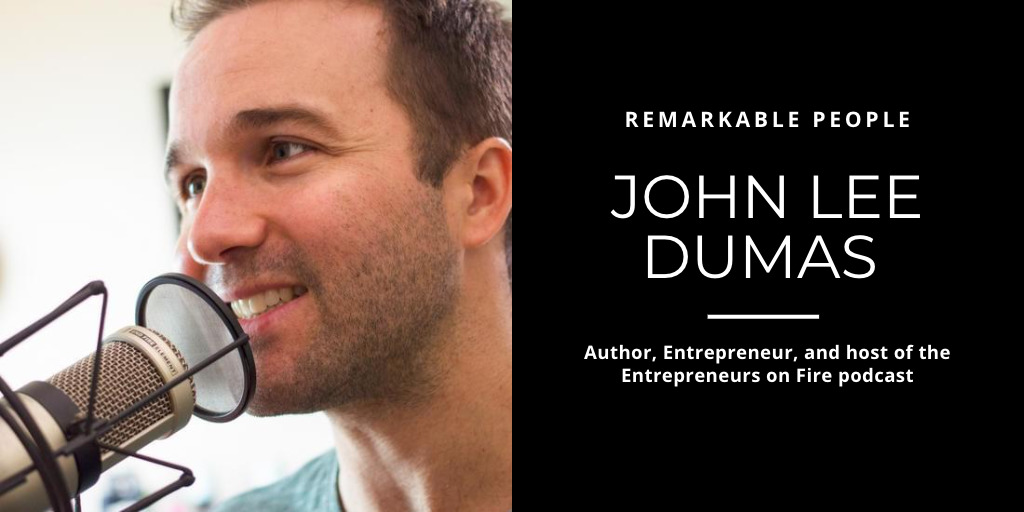
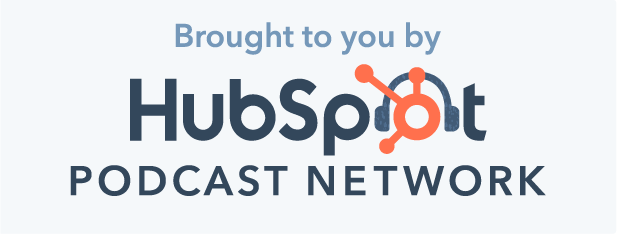
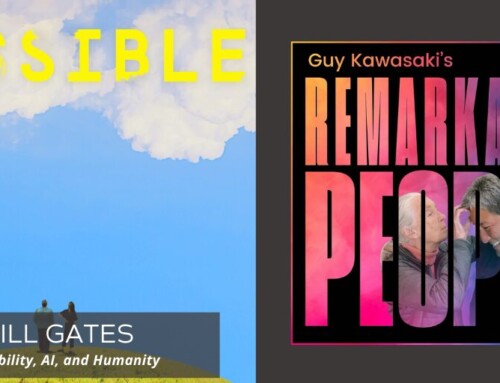
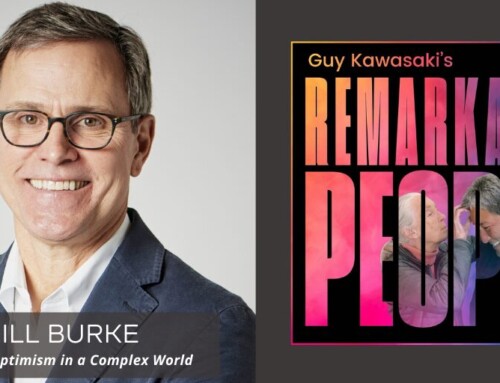
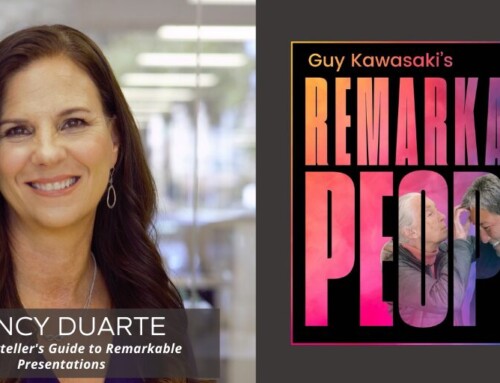
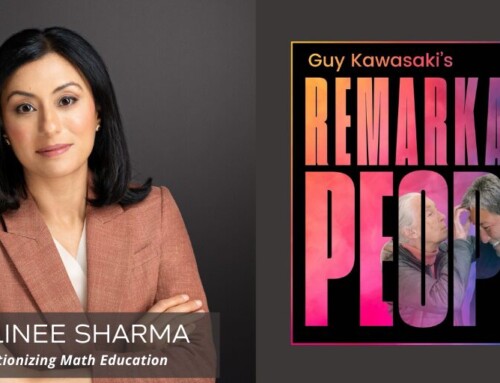
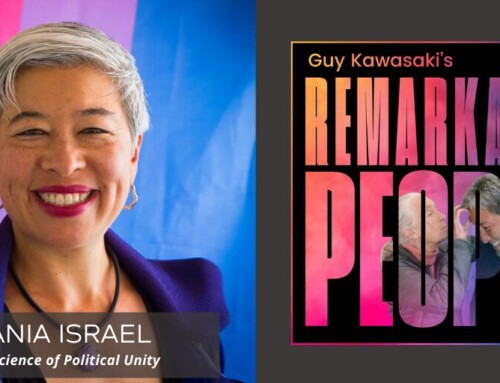
Leave a Reply